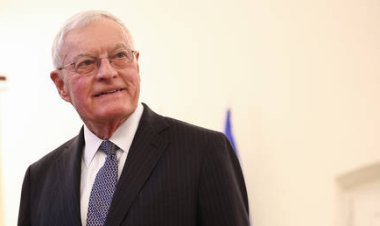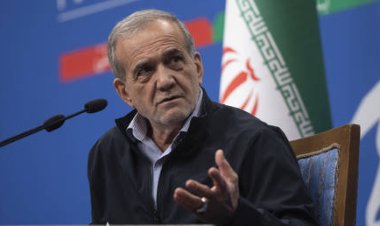Tuberville lifted his military blockade. But those officers are still stuck.
Officers nominated for four-star positions are still subject to the senator's hold, meaning lower-ranking leaders can't move up.


While Sen. Tommy Tuberville partially lifted his months-long blockade on more than 400 senior military promotions this week, many of those officers still can’t move on to their next posting because of his remaining holds on a handful of the highest-level positions.
That’s because a dozen officers nominated for the highest level positions — four-star general or admiral — are still subject to the Alabama Republican’s block as he continues to protest the Pentagon’s policy of reimbursing troops who travel to seek abortions.
Those include the nominees to lead multiple theater commands and take senior positions on the Joint Chiefs of Staff. Because they’re still stuck, that creates a ripple effect down the chain of command, and it won’t end until the Senate can slog through individual votes on the remaining nominees.
The Defense Department is working to ensure that as many of the 421 officers who were confirmed to lower ranks this week — one-star to three-star — can move into their assigned spots as quickly as possible, but that process will take time, said Pentagon spokesperson Sabrina Singh.
Some officers may be assigned to a temporary posting to wait out the holds, allowing their replacements to move up.
“It's not just flicking a switch and suddenly everyone moves into these new positions,” Pentagon spokesperson Maj. Gen. Patrick Ryder told reporters. “All of that has to be carefully orchestrated.”
Top officials say the holdup has real-world effects, as the Pentagon deals with conflicts on multiple fronts, from supporting Ukraine and Israel to fending off attacks on ground forces in Iraq and Syria and naval forces in the Red Sea.
“When it's unclear whether or not your senior leaders are going to be in place at the time and place they're needed, that of course creates unnecessary friction and does have impact on readiness,” Ryder said.
In one prominent example, Tuberville is still blocking Lt. Gen. Gregory Guillot, the deputy commander at U.S. Central Command, who is nominated to be the new head of U.S. Northern Command. That means Vice Adm. Brad Cooper, who was confirmed to replace Guillot at Central Command, can’t do so.
That also means Vice Adm. George Wikoff, who was confirmed to replace Cooper as the top commander overseeing all naval forces in the Middle East, has to stay put. The Domino effect continues down the line.
Similarly at the Pentagon, Tuberville still has a hold on Lt. Gen. Jim Mingus, now serving as the director of the Joint Staff, to be the Army’s No. 2. Even though his replacement, Lt. Gen. Douglas Sims, has now been approved for the promotion, he still can’t move into the new position until Mingus gets confirmed.
“We do have some cleanup to do,” Army Secretary Christine Wormuth said Thursday during a promotion ceremony for eight newly-confirmed officers. “I think there are some other lingering disruptions that are resulting from this process, and we're gonna work through that just as carefully as we can.”
“This is going to take a little while to unwind from this,” added Gen. Randy George, the Army chief of staff.
Ask to provide the number of lower-level officers who are stuck, Singh said the Pentagon was still working on it.
In addition to Tuberville’s hold, a half dozen promotions below the four-star rank are still being held up by Sen. Eric Schmitt (R-Mo.) over "those nominees’ stances or actions relating to divisive [diversity, equity and inclusion] programs," according to his office.
Officers aren’t the only ones in limbo. Tuberville has retained his hold on civilian nominees up for senior positions in the Pentagon. Two picks are pending in the full Senate and subject to the hold: Nickolas Guertin, the nominee to be Navy acquisition chief, and Ronald Keohane, tapped to be assistant secretary for manpower and reserve affairs.
Five more nominees await action by the Armed Services Committee and would be subject to Tuberville's hold once they are advanced, including Derek Chollet, who was tapped to be DOD’s policy chief. Chollet will face stiff opposition from Republicans if his nomination comes up for a vote. No civilian DOD nominees have been approved since April.
To get past Tuberville, Senate Majority Leader Chuck Schumer will need to file cloture and hold standalone votes to confirm the remaining 11 four-star military picks pending on the floor. A twelfth nominee, Adm. Samuel Paparo, tapped to lead Indo-Pacific Command, has not yet advanced out of committee, but will similarly need a standalone vote once he clears the panel.
"It's obvious to me that he realized he was doing significant damage to our national security, so he lifted the holds,” Sen. Mark Kelly (D-Ariz.) said of Tuberville. “But on the full admirals and generals, or people being promoted there, he didn't [realize]."
Schumer hasn’t yet outlined plans to hold votes on the remaining promotions. The Senate is scheduled to go into recess for the rest of the year after next week, but some Democrats want to make sure the officers are confirmed before the end of the year.
"That's still going to have a major impact,” Kelly said. “So we've got to figure out a path forward."












